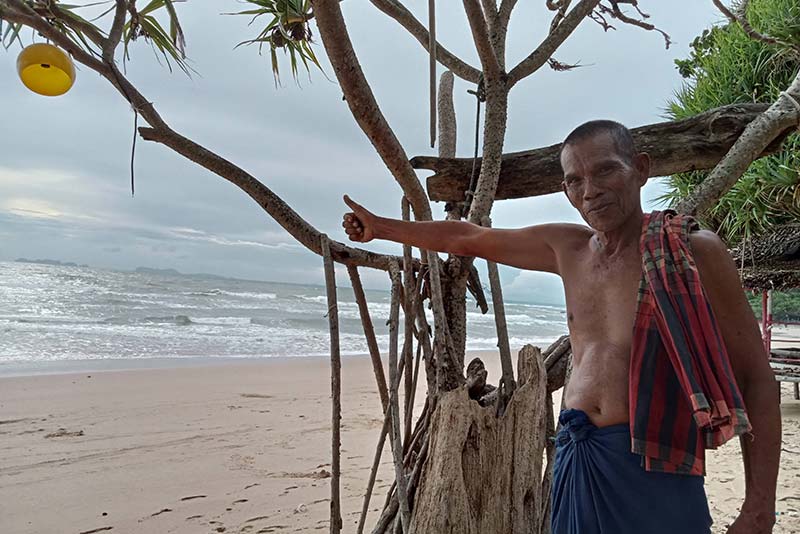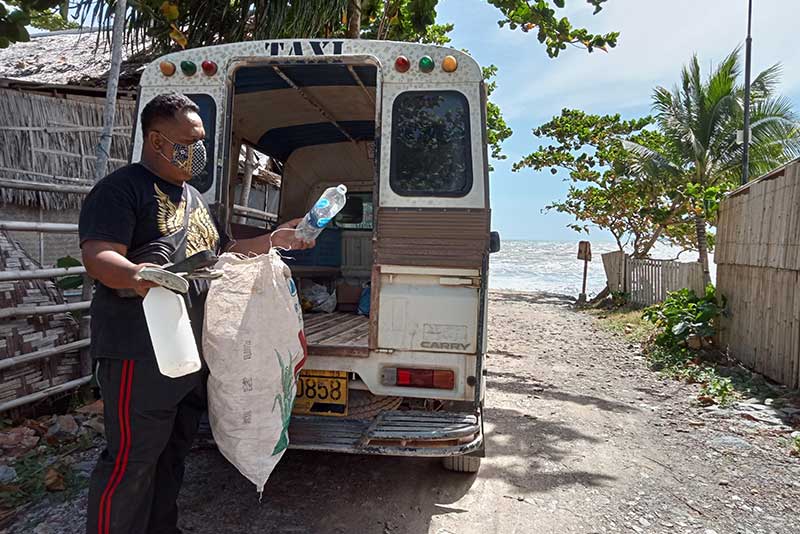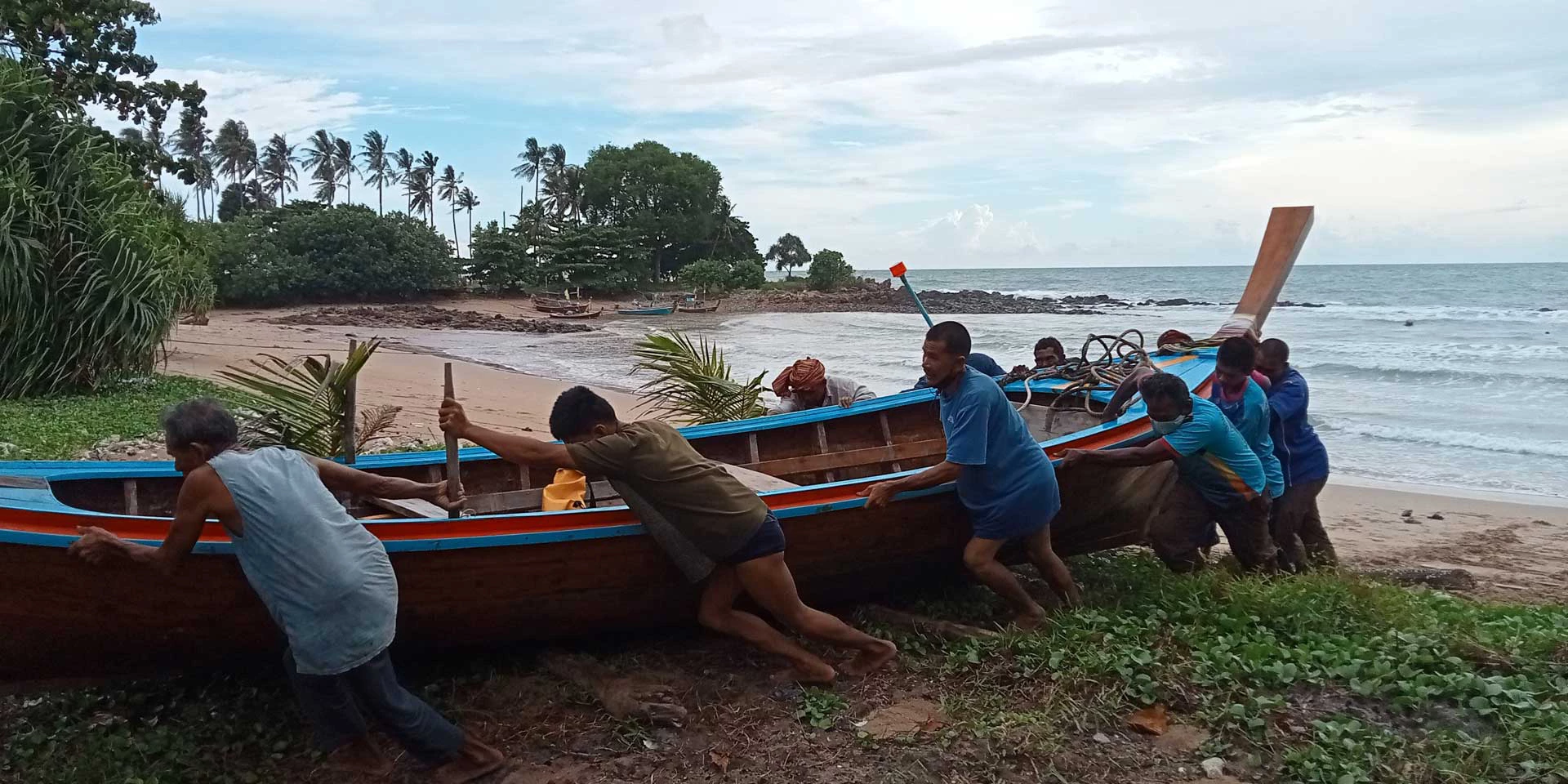By Kitchie Hermoso
Bang Mit is well known in his village in the southern part of Thailand for his generosity. One day, he grilled his freshest catch from the waters and gave it away to everyone who wanted to eat fish. For the past twenty-five years, he has managed a string of bungalows and a seafood restaurant in a popular seaside spot on the island of Krabi.
But now Bang Mit is a worried man. His bungalows stand empty because of the slowdown in tourism on the island, due to the impacts of COVID-19. Ever since the pandemic struck, he has been forced to rely on fishing to feed his family of eight and bring in extra income.
But it’s a mixed bag. These days he goes out to fish at midnight and doesn’t return home until eight in the morning. He keeps some of the daily catch for his family and tries to sell the rest in the local market. On good days, he can catch as much as twenty kilos of fish, but on others, he can only bring in five kilos.

Bang Mit. © Kitchie Hermoso/IFC
Oceans are an important source of income for the people of Thailand and many others in the Asia Pacific region. According to UNCTAD, most of the more than three billion people who depend on oceans for their livelihoods live in developing countries.
But the sustainability of oceans is under threat through overfishing, degradation of mangroves and coral reefs, and marine debris.
UNCTAD estimates the value of global ocean assets at over $24 trillion, making it the 7th largest economy in the world in terms of gross domestic product, GDP. By 2030, what’s now known as the Blue Economy will outperform the growth of the global economy according to OECD estimates.
However, unsustainable economic activities can lead to the ruin of the seas and oceans, eroding the resource base on which that growth depends. And if unsustainable fishing practices and deterioration of coastal and marine ecosystems continue, by 2050 it’s estimated there will be no usable fish stocks in the Asia Pacific region.
IFC is putting climate action at the heart of its development work. We are working to align investments with the goals of the Paris Agreement, intensifying our support to help clients decarbonize, and deploying market standards and tools to catalyze private sector financing for climate.
The Blue Economy goes beyond a focus on the oceans and seas. It also focuses on the land–and includes having measures such as recycling facilities and waste treatment plants, to prevent pollution in the waters.
There is currently an estimated 150 million tons of plastics in the world’s oceans, a number that could reach 250 million tons in less than 10 years, if current trends in urbanization, production and consumption continue. Unfortunately, the ongoing COVID-19 pandemic is also contributing to greater environmental damage through increased use and improper disposal of plastic waste.
From Taxi Driver to Trash Hero
Arun used to be a taxi driver in a southern province in Thailand but when COVID hit, he quickly switched gears and became a waste collector partly for additional income but also because of the overwhelming garbage he saw around his community. On July 26 he posted a photo of ocean trash he collected on his social media account with a caption that read: “Let's get it. Fifteen minutes. One sack. Caring for the environment, exercising, and earning a premium.” (translated from Thai).

Khun Arun showing trash he picked up from a beach in Krabi, Thailand. © Kitchie Hermoso/IFC
Making the Case for a Blue Recovery
IFC has been at the forefront of unlocking opportunities in the Blue Economy. An IFC report says further sustainable management of the Blue Economy could more than double its economic contribution to global GDP.
In November 2020, IFC announced its first ever blue loan exclusively focused on addressing marine pollution with Thai-based company Indorama Ventures Public Company Limited (IVL), a leading polyethylene terephthalate (PET) resin manufacturer.
A blue loan is an innovative way to raise funding for eligible projects which are tracked for supporting a Blue Economy.
The blue loan will help IVL recycle 50 billion PET bottles a year globally by 2025. The project is expected to yield emission savings of at least 150,000 tons of CO2 equivalent per year through substitution of virgin PET by recycled PET, and other climate-smart projects in resource efficiency and renewable energy. A key feature of the investment is to create value out of waste—processing post-consumer PET bottles that would have ended up in oceans or landfills or been processed into lower-value products—by promoting higher-value food grade bottle-to-bottle recycling which brings significant value generating potential.
Beyond financing, IFC and the World Bank produced market studies on plastics circularity for key markets in Asia including Thailand, Vietnam, Malaysia and the Philippines. The studies presented investment opportunities and specific regulatory reforms needed to create an enabling environment for plastics-related investments to thrive. For Thailand, the study found that 87 percent of the material value of plastics in the country—about $3.6 billion per year—is lost when 2.88 million tons are discarded rather than recycled into valuable materials. By unlocking barriers to investment, early adopters who want to take part in this untapped market can yield significant gains and at the same time contribute to saving the environment.
“Getting the business community in Thailand to help save our oceans is a tide that can lift people out of poverty, one that can have multiple ripple effects for a resilient and inclusive recovery,” says Jane Xu, IFC Country Manager for Thailand and Myanmar and Climate Anchor for East Asia and the Pacific.
Published in October 2021
